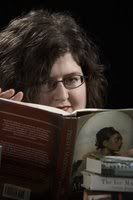 Becca Gibbs is tired of being Satan’s most infamous Rivka and the fun of thwarting his demands has begun to lose appeal. Inspired by her friend Teresa’s zest for life, Becca attempts to tie her life force to a goldfish hoping it will allow her to break free from Satan and still live. Unfortunately for Becca, her plan goes horribly awry when he shows up in the middle of the ritual. Now Satan’s commanded that she train Paige, her replacement, a wanna-be Rivka who seems to be channeling a ditzy cheerleader.
Becca Gibbs is tired of being Satan’s most infamous Rivka and the fun of thwarting his demands has begun to lose appeal. Inspired by her friend Teresa’s zest for life, Becca attempts to tie her life force to a goldfish hoping it will allow her to break free from Satan and still live. Unfortunately for Becca, her plan goes horribly awry when he shows up in the middle of the ritual. Now Satan’s commanded that she train Paige, her replacement, a wanna-be Rivka who seems to be channeling a ditzy cheerleader. As if training her own assassin isn’t bad enough, Becca has to deal with Nick Rawlings, the sexy Markku who is demanding she help him save his sister from her kidnappers. Their price? The death of Satan – so unless Becca can find a way to break free first, she’ll be one dead Rivka. Luckily Nick is the last of the Markku, the only group of beings who broke free from Satan, so if she can convince him to tell her all he knows about how his ancestors did it, perhaps they can help each other – that is if they can keep their hands off each other long enough to figure out a plan!
He Loves Me, He Loves Me Hot, the third book in the Goblet of Eternal Youth series, begins shortly after the events in Must Love Dragons, although it can easily be read as a stand-alone volume. Stephanie Rowe writes zany paranormal romances full of delightfully kooky characters guaranteed to make readers laugh. Once again, Satan steals the show whenever he appears. He is the stereotypical, insecure macho man: “And please, come to dinner on Sunday night. We can converse about how powerful and virile I am, and you shall regale me with stories about all the people you met this week who idolize me.”
As events unfold however, readers will quickly discover that despite his bluster, Satan is very attached to Becca and this humanizing aspect makes him a more appealing character. The addition of Satan, Jr. and his conniving mother, provides additional fodder for Rowe’s comedic wit. He Loves Me begins slowly but the action quickly hits a breakneck pace.
Read the review at Armchair Interviews.
Read an excerpt here.
ISBN10: 0446619019
ISBN13: 9780446619011
Mass Market Paperback
368 Pages
Publisher: Warner Forever
Publication Date: May 1, 2007
Author Website: stephanierowe.com
tags: books book reviews Stephanie Rowe paranormal romance Dragons Goblet of Eternal Youth Series


















